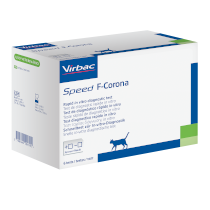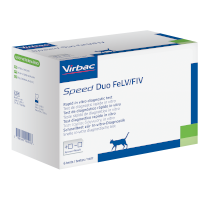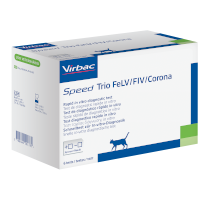
Rapid tests
Speed F-Corona
Test for detection of antibodies against FCoV (Feline Coronavirus) in cats.
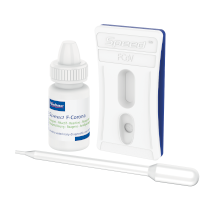
Simple and easy-to-use, Speed F-Corona tests provide serological result for Feline Coronavirus in 15 minutes only.
Speed F-Corona enables to :
-
Know the anti-coronavirus antibodies status of each cat
-
Gather additional arguments to reduce the hypothesis of FIP in cats with suspected feline peritonitis, in combination with other complementary tests (biochemical, haematological, analysis of effusion fluids, etc.).
For veterinary use only.
Product specifications
| Sample | Anticoagulated whole blood, serum, plasma or effusion |
|---|---|
| Target species | Cats |
| Handling time | 2 minutes |
| Time to results | 15 minutes |
| Storage | Long shelf life of 24 months at room temperature (2°C - 30°C) |
| Presentation | Box of 6 tests |
Why use Speed F-Corona ?
Feline Coronavirus (FCoV) is an RNA virus found in many cat environments around the world. The initial virus infects the small intestine (FeCV) and generally causes no symptoms or, at most, mild enteritis. However, in a small proportion of cats and under unpredictable circumtances, the virus undergoes multiple RNA mutations during replication, altering its tropism from enterocytes to macrophages. This pathogenic form of FCoV is responsible for extravascular leaking and vasculitis, leading to Feline Infectious Peritonitis (FIP). This fatal disease is polymorphic and may be associated with effusion and/or immune-mediated disorders.
FeCV is highly contagious through faecal excretion, and in households where many cats are present (e.g.shelters), the prevalence of serum FCoV antibodies indicating exposure is often high, up to 88%. Following infection, shedding continues for several days or months and persists in the environment (1).
In contrast, the prevalence of FIP in a population of FCoV-infected cats is rare (<10%), but is still under-diagnosed due to the complexity of its diagnostic. The disease can affect any cat, but young and older cats are more likely to develop FIP.
Therefore, measurement of serum anti-FCoV antibodies is useful for guiding preventative measures and can be used for FCoV control in multi-cat households. A positive FCoV antibody test indicates that the cat has been infected with FCoV (by natural infection or FCoV vaccination, although this vaccine is rarely used) and has developed antibodies; seroconversion typically occurs around 7 to 28 days following natural infection (1). It does not differenciate between FeCV and FIP pathotypes and does not necessarly mean that the infection is still active.
When to use Speed F-Corona ?
Speed F-Corona screens for coronavirus antibodies, without differenciating the pathogenicity.
Speed F-Corona can be used* :
- To screen cats that are about to be newly integrated into a group and to guide the separation between infected/exposed and healthy cats.
- To confirm the successful elimination of FCoV from groups of cats
- Following a thorough clinical examination, to increase the FIP diagnostic sensitivity when the test is performed on an effusion
- In association with a fecal FCoV test to help identify exposed cats shedding the virus
Be careful :
A negative FCoV antibody test does not fully rule-out FIP as 10% of FIP infected cats are seronegative for several suspected reasons (presence of antibodies bound to the virus in samples, neurological form of FIP...) (1)
A positive FCoV antibody test does not mean that the cat is FIP.
*Speed F-Corona should be interprated in the light of other complementary tests.
Quick Guide
For complete instruction, please refer to the product notice.
1. Add 1 drop of sample into the sample well.
2. Add slowly 5 drops of reagent into the sample well.
3. Read the result at 15 minutes.
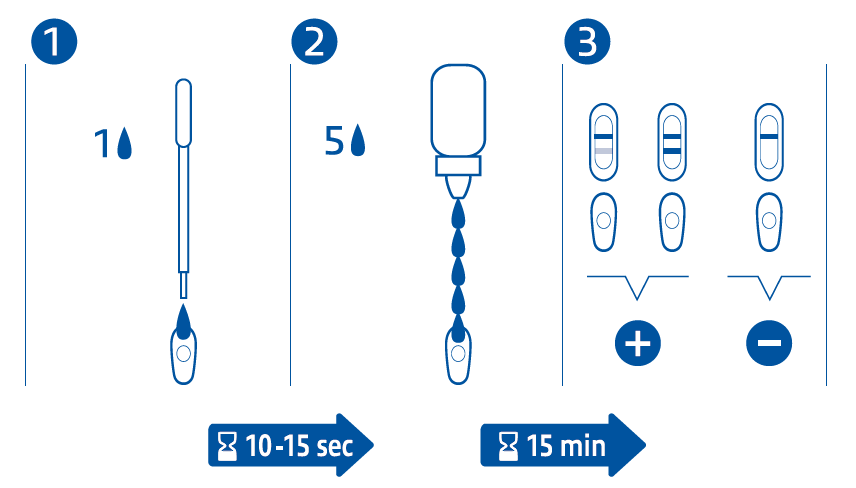
Speed F-Corona performances
| Reference method | FCoV Indirect Immunofluorescence |
|---|---|
| Sensitivity vs ref (3) | 94% |
| Specificity vs ref (3) | 100% |
References
(1) Tasker S, Addie DD, Egberink H, Hofmann-Lehmann R, Hosie MJ, Truyen U, Belák S, Boucraut-Baralon C, Frymus T, Lloret A, Marsilio F, Pennisi MG, Thiry E, Möstl K, Hartmann K. Feline Infectious Peritonitis: European Advisory Board on Cat Diseases Guidelines. Viruses. 2023 Aug 31;15(9):1847. doi: 10.3390/v15091847. PMID: 37766254; PMCID: PMC10535984.
(2)Thayer V, Gogolski S, Felten S, Hartmann K, Kennedy M, Olah GA. 2022 AAFP/EveryCat Feline Infectious Peritonitis Diagnosis Guidelines. J Feline Med Surg. 2022 Sep;24(9):905-933. doi: 10.1177/1098612X221118761. Erratum in: J Feline Med Surg. 2022 Dec;24(12):e676. doi: 10.1177/1098612X221126448. PMID: 36002137; PMCID: PMC10812230.
(3)ADDIE D et al.. Comparison of Speed® feline coronavirus antibody rapid immunomigration tests with inderect immunofluorescence. 2008, Feline Institute Pyrenees.
(4) CACHON T., CHUZEL T. Epidémiologie, pathogénie et symptômes de la PIF. Point Vétérinaire, 2005, 254, 18-21

